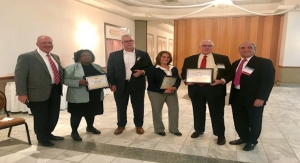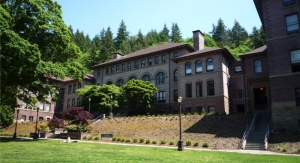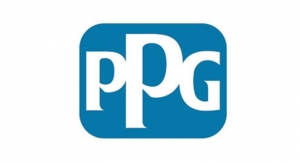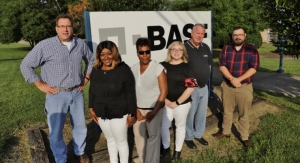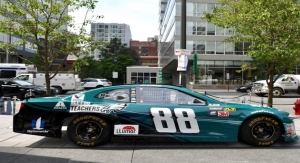Anthony Locicero, Associate Editor12.24.18
The Metro New York Coatings Association is planning to work with local colleges to recruit the next generation of employees.
“We’d like to see young people come in,” said Frank Magdits, Pan Technology’s VP of sales and marketing. “We’re not talking about just technical jobs.”
Representatives from NJIT (Newark), the Stevens Institute of Technology (Hoboken) and William Paterson University (Wayne) spoke at MNYCA’s Fall Forum, which took place Nov. 13 at the Hilton Meadowlands in East Rutherford, NJ – right near MetLife Stadium.
According to Siamack Shojai, Ph.D., the dean of WPU’s Cotsakos College of Business, a connection is needed to build a bridge between industry and academia.
There are three programs for the 1,800 undergrad students and 325 grad students that are part of the College of Business, Shojai said, adding that the university offers a bachelor’s degree in professional sales.
“Our students mature very quickly,” the dean said. “They need to know how to communicate, interview and present themselves.”
By the time they graduate, “they’re ready to go and hit the road,” he added. “[Employers] don’t have to invest much in training.”
The school established at four-day summer boot camp called Crux of Industry Niche – or COIN, for short.
The Crux of Industry Niche is an initiative that provides industry-focused and scalable boot camps to supplement the existing programs at the Cotsakos College of Business, per William Paterson’s website.
Shojai said that the many of the College of Business’s programs lead to networking and internship opportunities – and eventually, a full-time job.
There are two cycles – “A” and “B” – as part of the five-year program.
The “A” cycle begins in the student’s second year, with “B” following in the third. There is an eight-month co-op period for each cycle.
“Ninety-five percent of students return for the second cycle,” McCarthy said. “They will have spent 16 months with you [employers]. That really reduces your recruiting costs.
“With internships, by the time they get up to speed, they’re going back to school,” he added.
Students must have a minimum 2.5 GPA and take a professionalism and ethics course as a pre-requisite, according to McCarthy.
As part of the co-op, students are introduced to a platform called “Handshake” – a virtual job posting site.
Stevens also has a five-year program with a co-op, which has been in existence for three-plus decades, according to Lynn Insley, executive director, the Stevens Career Center, Stevens Institute of Technology.
“This is our signature work-based program,” said Insley, adding that 600+ co-op assignments are completed annually – mostly in the Tri-State area. “We are developing the next generation of the workforce.”
Between their sophomore and junior years, students rotate a semester of work with a semester of study – gaining up to 22 months of work experience, according to Insley.
The school offers summer internships for undergrads, programs for master’s and doctorate students, four career fairs per year, an internship fair, as well as on-campus recruiting.
A recruiter or hiring manager can “spend the day in the Career Center” and arrange interviews with students “without obligation,” Insley said.
Many MNYCA members voiced the concern of not having the time to meet with college representatives or visit campuses.
Bruce Schimmel, director of sales at Superior Materials Inc., suggested a student presence at Eastern Coatings Show 2019 in Atlantic City, mentioning the Intro to Paints & Coatings course, which is free for students.
McCarthy also said that schools could host future events.
Attracting new talent is something the MNYCA has been discussing.
“We’d like to see young people come in,” said Frank Magdits, Pan Technology’s VP of sales and marketing. “We’re not talking about just technical jobs.”
Representatives from NJIT (Newark), the Stevens Institute of Technology (Hoboken) and William Paterson University (Wayne) spoke at MNYCA’s Fall Forum, which took place Nov. 13 at the Hilton Meadowlands in East Rutherford, NJ – right near MetLife Stadium.
According to Siamack Shojai, Ph.D., the dean of WPU’s Cotsakos College of Business, a connection is needed to build a bridge between industry and academia.
There are three programs for the 1,800 undergrad students and 325 grad students that are part of the College of Business, Shojai said, adding that the university offers a bachelor’s degree in professional sales.
“Our students mature very quickly,” the dean said. “They need to know how to communicate, interview and present themselves.”
By the time they graduate, “they’re ready to go and hit the road,” he added. “[Employers] don’t have to invest much in training.”
The school established at four-day summer boot camp called Crux of Industry Niche – or COIN, for short.
The Crux of Industry Niche is an initiative that provides industry-focused and scalable boot camps to supplement the existing programs at the Cotsakos College of Business, per William Paterson’s website.
Shojai said that the many of the College of Business’s programs lead to networking and internship opportunities – and eventually, a full-time job.
This fall, NJIT’s School of Engineering – also known as the Newark College of Engineering – will offer a co-op program for sophomores and juniors – or second- and third-year students as John P. McCarthy, director of Research Development, NJIT, said the school refers to them.
The students declare and each department has an academic advisor who vets the candidates, McCarthy said.There are two cycles – “A” and “B” – as part of the five-year program.
The “A” cycle begins in the student’s second year, with “B” following in the third. There is an eight-month co-op period for each cycle.
“Ninety-five percent of students return for the second cycle,” McCarthy said. “They will have spent 16 months with you [employers]. That really reduces your recruiting costs.
“With internships, by the time they get up to speed, they’re going back to school,” he added.
Students must have a minimum 2.5 GPA and take a professionalism and ethics course as a pre-requisite, according to McCarthy.
As part of the co-op, students are introduced to a platform called “Handshake” – a virtual job posting site.
Stevens also has a five-year program with a co-op, which has been in existence for three-plus decades, according to Lynn Insley, executive director, the Stevens Career Center, Stevens Institute of Technology.
“This is our signature work-based program,” said Insley, adding that 600+ co-op assignments are completed annually – mostly in the Tri-State area. “We are developing the next generation of the workforce.”
Between their sophomore and junior years, students rotate a semester of work with a semester of study – gaining up to 22 months of work experience, according to Insley.
The school offers summer internships for undergrads, programs for master’s and doctorate students, four career fairs per year, an internship fair, as well as on-campus recruiting.
A recruiter or hiring manager can “spend the day in the Career Center” and arrange interviews with students “without obligation,” Insley said.
Many MNYCA members voiced the concern of not having the time to meet with college representatives or visit campuses.
Bruce Schimmel, director of sales at Superior Materials Inc., suggested a student presence at Eastern Coatings Show 2019 in Atlantic City, mentioning the Intro to Paints & Coatings course, which is free for students.
McCarthy also said that schools could host future events.
Attracting new talent is something the MNYCA has been discussing.
"This fall forum was a great opportunity for us and our members. One of the common themes not regularly discussed is how to attract new and creative talent not only to the coatings industry but to smaller companies as well," said MNYCA President Jason Anagnostis Ph.D., the VP and GM of P.O.R. Products. "The MNYCA board has decided to think of ways to help our members through our forums and eventually a few sponsored workshops.
"The Fall Forum was our first pass at getting the idea out to our members," he continued. "We felt that creating strong ties with the great college and universities we have in the area was a terrific path forward. One way to build those ties is establishing co-op and internship opportunities to give soon to be graduating students a view into our industry.
"Sure, a few of the member companies have been around for 40, 50, 60 and [even] 90+ years, but it is not a stale industry and if we encourage new grads to look more closely we all can benefit from a fresh influx," Anagnostis added. "[The] paint and coatings [industry is] not typically the first thought of most college graduates, so if we can build the foundation for companies and colleges to connect then we have succeeded in helping the industry grow."
Most of the organization's forums are technical in nature. This was a shift in focus, though one deemed necessary by members.
“Our MNYCA Fall Forum was a step in a new direction for our association. Instead of staying with a technical subject format we decided to focus on a softer but important topic: Acquiring and developing talent for the coatings industry," said Frank Magdits, VP of MNYCA's Executive Board and business development manager, dispersions for Aakash Chemicals & Dye-Stuffs, Inc.
"The panel discussion was extremely informative, bringing new light onto how our member companies can leverage their career placement offices," continued Magdits, the former VP of sales and marketing for Pan Technology. "We now have a mechanism to bring awareness, introduce ourselves and offer job opportunities to their student populations.
"It was a real eye-opener as to the services these institutions can provide to our member base," he added. "There were plenty of questions from the audience as the interest level was indeed high. No doubt, there are next steps towards making this program grow to the benefit of the MNYCA and the job-seeking student."


